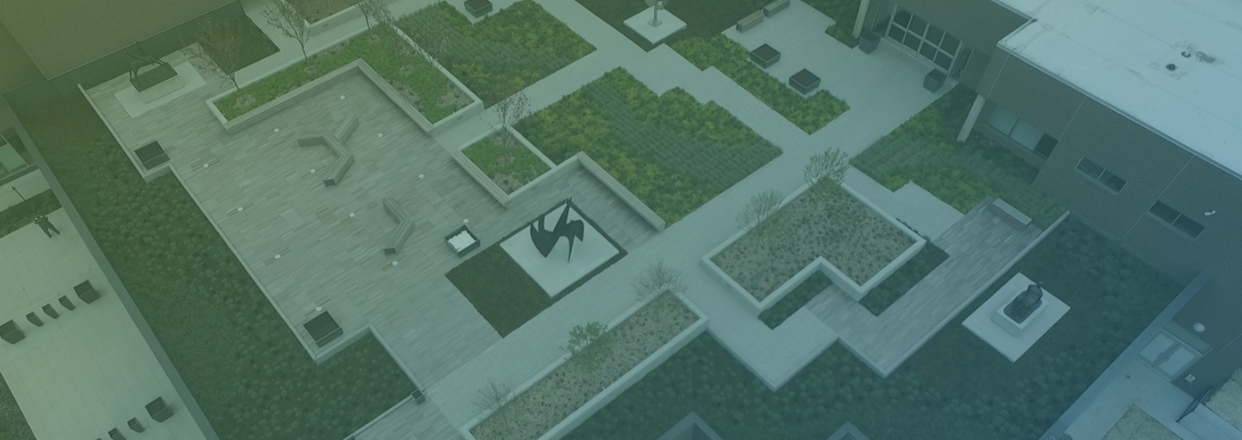
obs Frederik Meijer Gardens & Sculpture Park: A Garden Oasis Among Urban Development
August 22, 2019
Since opening its doors in 1995, Frederik Meijer Gardens & Sculpture Park has welcomed over 12 million visitors to the major cultural attraction focused on horticulture and sculpture. The 158-acre property includes Michigan’s largest tropical conservatory, a LEED-certified main building, five different indoor gardens, outdoor gardens, nature trails and sculptures. It is located on the boundary of two watersheds: the entrance is located in the Coldbrook Creek watershed and the rest of the park is located in the Plaster Creek watershed.
Built on pristine land acquired by the West Michigan Horticultural Society over 30 years ago, its history of orchards and forest are still visible in certain spots today. No stormwater infrastructure was installed on most of the property when it was first developed, requiring FMG to manage its stormwater primarily through natural methods. All stormwater runoff is infiltrated on site except for one small parking lot at the front of the property. Various stormwater controls help to protect wetlands and allow the water to infiltrate at a slower rate.
Engineered landscape depressions and rain gardens allow water from parking lots to infiltrate more quickly. Trees and native plants that have been planted in the parking lots serve as buffers to runoff and offer a cooling effect during hot summer months.
Stormwater is further directed to ponds that act as holding tanks, especially important during the first rain after a dry spell to mitigate the infiltration of pollutants into the ground, and has additional benefits: The Heckman Family Pond on the property supplies all of the water to the venue’s irrigation system. A “just-enough watering” irrigation system utilizes a weather station that provides an estimate of the water that evaporates out of the plants each day. Based on those numbers, a run time for every irrigation station on the property is created so that each zone receives only the amount of water it needs. Lastly, stormwater is sent on a rejuvenating journey through the gardens, where it is filtered through many different types of plant material, before it is absorbed back into the atmosphere or ground.
In addition, there are 200 acres of land not accessible to the public that are maintained in their natural state until they can be developed. In this plot of land, invasive species are removed through controlled burns, injections, and weed removal, and many animal habitats have been restored. FMG also avoids stocking the Japanese pond on their property with koi fish as to not invade nearby streams with invasive species.
Green infrastructure has been incorporated into the design of the space and offers benefits that blend into the everyday operations. There are minimal cleaning and maintenance costs for catch basins and retention ponds, comparable to that of conventional construction.
Recently completed rooftop garden includes trees and bushes that provide intensive water control and help moderate temperature.
New Expansion Features Green Roof
Currently, Frederik Meijer Gardens & Sculpture Park is in the midst of a major expansion, driven by a $115 million capital campaign. A recently completed 22,000-square-foot rooftop garden includes trees and bushes that provide intentional and intensive water control. The rooftop sculpture garden provides other environmental benefits including moderating temperature changes in the Covenant Learning Center below and provides a diverse habitat for bird, butterflies and insects.
Other highlights that the project will include a new 60,000-square-foot, LEED-certified Welcome Center and the 20,000-square-foot, LEED-certified Covenant Learning Center, along with expanded and accessible parking with urban gardens.
Frederik Meijer Gardens & Sculpture Park is a charitable 501(c)(3) not-for-profit organization that promotes the enjoyment, understanding and appreciation of gardens, sculpture, the natural environment and the arts. Meijer Gardens is committed to create a legacy of rich cultural and learning experiences for generations to come. In 2018, Meijer Gardens was listed in the top 30 most visited museums in the United States by The Art Newspaper, the leading publication in global art news. Their 158 acre main campus is known as one of the nation’s most significant sculpture and botanic experiences and houses Michigan’s largest tropical conservatory, five indoor gardens, outdoor gardens and nature trails, sculpture galleries, library, cafe education center and meeting rooms.
